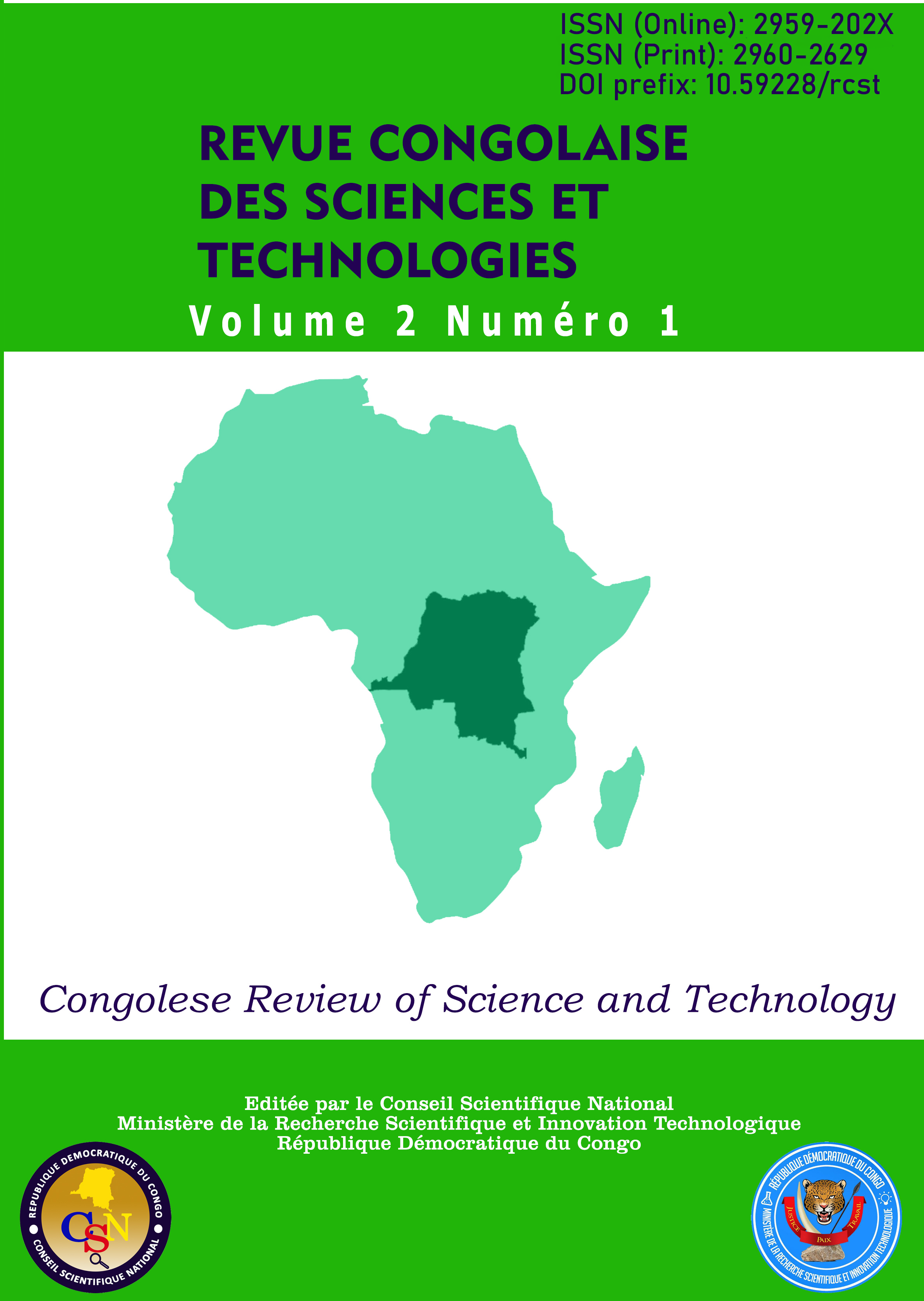Etudes pétrographique et minéralogique comparatives des roches phosphatées des gisements de Kanzi et de Mvuangu au Kongo Central, RD Congo Comparative petrographic and mineralogical studies of phosphate rocks from the Kanzi and Mvuangu deposits in Central Kongo, DR Congo
Main Article Content
Abstract
The aim of the present work is to make a comparative study on the geology, petrography, mineralogy and digital mapping of
phosphate rocks from the Kanzi and Mvuangu deposits. The polarised light petrographic microscope and QGIS version 3.6
software were used. The results obtained from the field data and laboratory analyses indicate that petrographically, the Kanzi
rock has a micrograined (chalcedony) and grained structure, whereas the Mvuangu rock is essentially composed of quartz
grains and pebbles. Mineralogically, these rocks consist mainly of collophanite but also hematite, kaonite and illite. The
development of these phosphate rocks through the creation of a local industry for the production of phosphate fertilisers,
given the importance of these deposits, would boost the development of agriculture in the Democratic Republic of Congo and
the sub-region, while contributing to job creation, given that mining is one of the main sources of formal employment in
Africa.
Article Details

This work is licensed under a Creative Commons Attribution-NonCommercial-ShareAlike 4.0 International License.
References
Barry, G.S. (1981). Evaluation des gisements de
phosphates du Bas-Zaïre, République du
Zaïre. Projet ZAI/75-009. Report to DTCD,
United Nation, New York.
Beauregard, M.S. (2010). Impacts de la fertilisation
phosphatée sur la biodiversité microbienne de
sols agricoles [Thèse de Doctorat, Université
de Montréal].
Bentor, Y.K. (1953). Relations entre la tectonique et
les dépôts de phosphates dans le Neguev
Israélien. Internat. Geol. Gong, 11, 93-101.
Chien, S.H, Hammond, L.L. (1978). A comparaison
of various laboratory methods for predicting
the agronomic potential of phosphate rock for
direct application. Soil Sa. Soc. Am. J., 42,
PP.1758-1760.
Erthart, H. (1937). La genèse des sols en tant que
phénomène géologique. Masson, Paris.
FAO (2004). Utilisation des phosphates Naturels
pour une agriculture durable division mixte
FAO/AIEA, Rome.
Jourani, E. (1988). Anatomie séquentielle et
géochimique des phosphates de Bouabout
(Gisement de Meskala, Maroc) : Eléments
pour un modèle génétique [Thèse de Doctorat
Académie de Bordeaux].
Kasongo R.K. ,Van Ranst E. ,Verdoot, Kanyakogote
P et Baert G. (2012). Réponse du Soja
(Glycine max) à l’application de phosphate de
Kanzi et de dolomie rose de Kimpese sur sol
sableux en R.D. Congo. Can. J .Soil, 92 :905-
Kasongo, R.K., Van Ranst, E., Verdoot,
Kanyakogote, P. & Baert, G. (2009). Roche
phosphatée de Kanzi comme engrais à
propriété amandente pour les sols sableux de
l’hinterland de Kinshasa. Etude et Gestion des
sols, 17,47-58.
Mouflih, M. (1991). La série phosphatée du gisement
de Benguerir séquences de facies, évolution
séquentielle, minéralogique et
géochimie (Mastrichien-Lutetien) [These de
em cycle, Université Cadi Ayyad].
http//toubkal.imist.ma/handle/123456789/163
Mupepele, L., Intiomale, J.P & Kabonwa J. (2004).
The phosphate deposits of Bas–Congo in
Democratic Republic of Congo. Inédit.
Ngimbi, C. & Ndumba, R. (2023). Carte
d’échantillonnage de la zone d’étude [Carte].
Inédit.
Ngimbi, C. & Ndumba, R. (2023). Carte de
localisation des bassins sédimentaires de le
RDC [Carte]. Inédit.
Ngimbi, C. & Ndumba, R. (2023). Carte géologique
de la zone d’étude [Carte]. Inédit.
Pouthier, G. (1996). La minéralogie des minerais de
phosphates, Sofremines. Inédit.
Tournis, V., Rabinovitch, M. (2010). Les ressources
naturelles pour la fabrication des engrains :
USGS 2010 Minerais yearbock phosphate
Rock (Advance Reases).
van Staaten, P. (2007). Agrogeology: The USE of
rocks for crops. Enviroquest limited.
Cambridge, Ontario, Canada.

